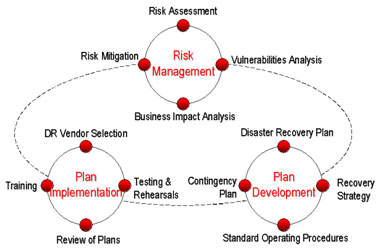 |
|
Founded in June 2003 in Singapore, ACROSS
Consulting primarily offers professional consultancy services
on Operational Continuity Planning, OCP in short. The principal
goal of OCP is to empower companies with the means and tools
to prevent against, prepare and equip for, respond to and recover
from any undesired interruption or disaster experienced by the
company.
Key components and tasks in the OCP process include risk assessment,
vulnerabilities analysis, business impact analysis, risk mitigation,
disaster recovery and contingency planning and the development
of Standard Operating Procedures.
Overview of Operational
Continuity Planning |

Besides OCP, ACROSS Consulting offers professional
consultancy services on office relocation planning to companies
who plan to expand or diversify their business operations and
relocate their headquarters, branch offices and manufacturing
plants to another location.
Benefits of Operational Continuity Planning
Most commercial auditors tend to view operational continuity management as a conscious effort by the Company to guarantee the security and integrity of its data processing capability. Hence putting in place a comprehensive operational continuity process for the Company will be recognized as an extra gain or advantage for your Company and it will be well reflected in the auditors' report.
| · |
Investors
Operational continuity management safeguards the interests
of shareholders. Fulfillment of this obligation provides
investors ( both existing and potential ) greater assurance
and confidence in the reliability and resilience of your
Company to deal with an emergency situation. Such level
of confidence has definite positive impact on the shares
prices of your Company.
|
| · |
Partners
Operational continuity management portrays and projects
a positive corporate image as a "well-prepared" Company
and assures your partners of continuity in the supply
of services to them.
|
| · |
Customers
Operational continuity management processes strengthens your Company's service delivery capabilities. This provides your customers the assurance of continuity in the supply of services. Besides enhancing the branding effort and raise the reputation of your Company and your services, such increased confidence level also gives your Company the competitive edge to capture a greater market share while retaining customer loyalty.
|
BCM ( Business Continuity Management ) Certification with SPRING Singapore is voluntary, but with rapid changes in business practices globally and the need to respond to fast changing environment will compel companies to re-examine the continuity of their operations. An increasingly large number of MNCs are including Business Continuity Management as part of their suppliers' assessment and selection process to ensure a constant and reliable supply of materials and services. For those companies wanting to venture overseas, BCM Certification will serve as a good internationalization tool. It assures foreign partners of continuity in the supply of goods and services. This will greatly facilitates the internationalization effort of your Company.
Operational continuity management is a corporate wide endeavor; it requires active participation of individuals from different division and departments in the Company. Their involvement provides them with an insight into other business activities and this will improve the knowledge sharing and teamwork among your employees.
Putting in place a comprehensive, effective and well-tested operational continuity plan will enhance your Company's negotiation capability and bargaining power with commercial insurers during policy renewals and facilitate the insurance policies renewal process. Following the September 11 events in the United States and other global incidents, premiums for business interruptions have risen sharply and operational continuity management plays an important role in providing the required level of comfort for the insurance companies at the time of policy renewals.
Operational continuity management process enables your Company to re-examine, review and refine all existing processes. Such provision can identify possible and permissible consolidation and leverage opportunities to bridge operational gaps and improve the overall operational efficiency of your Company.
Operational continuity management identifies, analyzes and controls risks that could be possibly faced by your Company. By reducing or removing potential vulnerabilities and threats exist in the Company, it can significantly prevent and reduce the level of risk exposure of your Company. The lower the level of risk exposure, the lesser your Company would need to depend on an extensive operational continuity plan.
Operational continuity management is an essential and integral part of sound corporate governance. Sound corporate governance stipulates that Boards respond to new challenges by putting in place measures that will systematically and thoroughly identify, analyze and control risks to its stakeholders and the public. This extends to developing and protecting intellectual properties, managing brand effectively, dealing with public relations, particularly in respect of existing investor relationships and operational continuity. Such good corporate governance practices can help to ensure that your Company is fully prepared to manage potential threats, and to maximize the opportunities to be gained from the business risks
Operational continuity management raises the level of readiness and preparedness of your Company against business interruptions. Such readiness and preparedness enables your Company to resume its disrupted operations and / or continue business at an acceptable level of operation, reducing the negative impact of the interruption.
|
|
|
|





